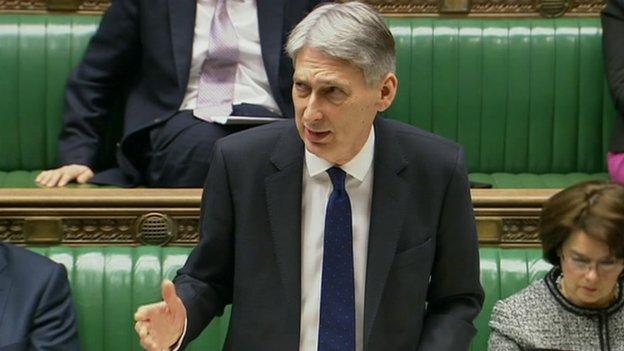Budget 2017: Lagoons, city deals and 'Box Office Phil'
- Published
- comments

'This discussion is still ongoing. I hope we may bring it to conclusion within, let's say. the next 8 days' - Philip Hammond on investment plans for Swansea.
It's about this time of year that I'm often asked: "David, what's going to be in the Budget?"
I usually patiently explain that if I knew what was in the chancellor's red box, I probably wouldn't have to work for a living. But there are a few areas where we have a good idea of what Philip Hammond is planning.
Some Budget changes have already been announced. It's always helpful to remember this when MPs start cheering re-announced tax cuts or fuel duty freezes.
In the new financial year that begins on April 6, the amount you can earn before paying income tax will rise from £10,600 to £11,500. The higher rate threshold will rise from £43,000 to £45,000.
For savers, the annual ISA limit rises from £15,240 to £20,000. Corporation tax will be cut from 20% to 19%. Insurance premium tax will rise from 10% to 12% in June. Petrol duty is frozen until April 2018.
'Spending'
The Treasury has already trailed several announcements that will mean higher spending on technical education and (some) schools in England. The Welsh Government will get a share of increases in comparable spending in England, to spend as it chooses. If the chancellor announces extra cash for social care in England, the same rule applies.
Business rates are more complicated. They are devolved, but if Mr Hammond finds some more money for England via the Department for Communities and Local Government, then expect a cheque to head west to Cardiff Bay too.
Philip Hammond may be known ironically as 'Box Office Phil' in some quarters but he may have unwittingly raised expectations about the proposed Swansea Bay Region, external City Deal when he jaunitly told MPs last week: "This discussion is still ongoing. I hope we may bring it to conclusion within, let's say. the next 8 days."
Since then UK government sources have suggested that more work needs to be done before the city deal is formally signed off, although there may be more "warm words" in the Budget speech.
'Optimistic'
Supporters of the Swansea Bay tidal lagoon project who expect the chancellor to give the go-ahead tomorrow are likely to be disappointed. Although a report it commissioned was effusive about its potential, the Department for Business, Energy and Industrial Strategy does not appear to have given its approval.
One of the city's MPs, Carolyn Harris, is more optimistic that Mr Hammond will respond positively to her campaign to stop councils charging for children's funerals.
Finance Secretary, Mark Drakeford, may be less certain that the Welsh Government's Budget shopping list - more money for health and social care, no more cuts and an end to austerity - will meet with a warm reception from the chancellor. With Mr Hammond warning about eye-wateringly high levels of debt and against spending sprees, any cash boost is unlikely to be more than modest.
The new chancellor approaches the Budget rather differently from his predecessor, George Osborne, who often gave the impression Budget day was a news deadline. Mr Hammond appears content to wait for a policy to be worked through rather than to announce it to an artificial deadline.
'Economic'
Stephen Crabb, who served alongside both men in David Cameron's cabinet told me: "Philip Hammond takes a much more accountant-like approach. He's interested in cold, hard facts - cold, hard numbers. And this is where the challenge is for Welsh politicians in terms of securing more investment into Wales - is to make winning economic arguments.
"With George Osborne it was much more about the politics, particularly in the run-up to the 2015 general election. We're now in a phase where actual cold, hard economic arguments will sway the Treasury, probably little else."
If you have six minutes to spare, I've put together a few things to look out for in this Sunday Politics film.